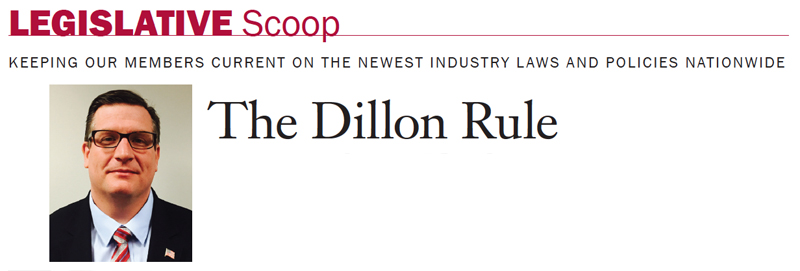Written By: Tyler Craddock
Property managers know that local governments can have a significant effect on those who manage rental properties and those who own them. Thus, it logically follows that the manner in which local authority is delineated and interpreted is something that every property manager needs to understand.
The key question to ask involves whether your state is a Dillon Rule state or a Home Rule state. The answer is significant for how policies are developed that affect property managers and owners. The differences between the Dillon Rule and Home Rule lie in how local government powers are enumerated and interpreted.
So, let us look at the two models so that we can understand their differences and significances.
The Dillon Rule was penned by Judge John Forrest Dillon in his opinion in Clinton v. Cedar Rapids and the Missouri River Railroad (1868). Here is the essence of the Dillon Rule in his words: “The true view is this: Municipal corporations owe their origin to, and derive their powers and rights wholly from, the legislature. It breathes into them the breath of life, without which they cannot exist. As it creates, so it may destroy. If it may destroy, it may abridge and control. Unless there is some constitutional limitation on the right, the legislature might, by a single act, if we can suppose it capable of so great a folly and so great a wrong, sweep from existence all of the municipal corporations in the State, and the corporation could not prevent it. We know of no limitation on this right so far as the corporations themselves are concerned. They are, so to phrase it, the mere tenants at will of the legislature.”
In short, under the Dillon Rule, local governments have only those powers that are expressly granted by the state legislature. If some power or discretion is not expressly granted to the local government, then it is reserved to the state. A vast majority of states are Dillon Rule states, at least in part.
The most important advice we received was to include a claw-back clause.
Home rule, on the other hand, generally means that localities have any power not expressly prohibited them by state or federal constitutional or statutory law. Examples of Home Rule states include New Jersey, New Mexico, Utah, South Carolina, and Montana.
The key point of the Dillon Rule is not that local governments’ powers are limited as a matter of course. It is not a matter of power. It is simply a tool of how we craft and interpret state law with respect to local governments. We interpret the law to mean that local governments only have the powers they are expressly given by the state; whereas under Home Rule, they are only prohibited those powers that are expressly prohibited.
You can have powerful local governments in Dillon Rule states, if a state so chooses, and you can have weak local governments in Home Rule states.
So, you ask, which is better and why? It depends.
Based on the Virginia experience, I would exclaim from the mountaintops that Judge Dillon is a great American. There is a reason that Virginia has been consistently ranked as one of the best states in which to do business. Today, debates concerning the legal authority that localities have or don’t have, are held in the General Assembly, which has sessions that last 60 day one year and 45 days the next. Whatever the General Assembly decides, there is generally a consistent policy set throughout the Commonwealth.
Consistency is very important, in that a business knows what the “rules of the game” are in whatever localities they may choose to do business. Can you imagine what the business climate (and Virginia‘s national and international competitiveness) would be like in the Commonwealth if the battleground for business issues was in more than 100 localities, 365 days a year?
In Virginia, the state government has generally used its power in a way that promotes pro-business policies. Indeed, Virginia’s success and consistency may derive as much from the policy choices it makes as the process by which it makes those choices.
But, your experience in your state might be different. Imagine, for a moment, if a Dillon Rule state used its power in a way that required things like rent control or rental registries, and in doing so, prevented localities from declining to enact those things because they did not have an expressed opt-out in state law. Or, imagine if a Home Rule state expressly forbade rent control.
Thus, while policy choices are important, so too is process. It is therefore important to understand how your state enumerates local powers so that you know the best way to get at those things that are most important to you.
Current editions of the award-winning Residential Resources magazine is sent eleven times a year to members. Join NARPM to receive all of the benefits of membership and receive current editions.
Residential Resources: Narch 2018 Issue | Volume 29 | Number 3
Copyright © 2024 National Association of Residential Property Managers®. All Rights Reserved. Do not reprint without permission.

